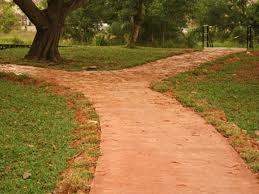 Some of my recent posts have been a bit of a downer for those of you who want to get a PhD in Biblical Studies (or Theology, Church History, etc.). I’ve given you some tough love, born out of my own experience and hard economic realities (here and here).
Some of my recent posts have been a bit of a downer for those of you who want to get a PhD in Biblical Studies (or Theology, Church History, etc.). I’ve given you some tough love, born out of my own experience and hard economic realities (here and here).
The market is dismal, the odds are against you, and, frankly, you have to be crazy to invest so much time and energy getting a degree that, statistics say, you likely won’t get.
Judging by your comment and emails, some of you are feeling quite stressed about this. Your great plans don’t look so great anymore and you don’t know what to do.
If you really feel, deep down, that further education is the path you need to walk, here’s what you do.
Trust God.
I don’t mean trust God to get you into the right school, or trust God to provide you with a tenure track job so it all “works out,” or trust God to let you know right now, before you commit yourself to this madness, whether it is God’s will. I don’t mean mean trust God “to” anything. I just mean trust God, here and now, not for what you want him to do eventually.
That means learning the excruciating lesson of letting go—of fear, of control, of manipulation, of posturing, of jealously–of ourselves. It means trusting God with your life, which, I think we can all agree, is a very hard business (a lot harder than getting a tenure track teaching job, that’s for sure).
Trust God that he will honor your decision and walk this path with you–even though you have no idea where this path will lead. Your academic work may lead to a “conventional” teaching position that you envision now. Or, it may lead you somewhere that will be twice as fulfilling that you can’t even picture are the moment. Either way, you actually have no idea whatsoever what you will be doing 5-10 years from now. You do not have the future in your hands. God does. What you do have is now, and with each passing moment you have a decision to make:
Today, will I trust or will I fear?
That, simply put, is the choice we all make daily, whether we perceive it or not. You are just blessed enough to be made conscious of that choice. And it makes all the difference in how we perceive our lives, whether we feel we are, in some mysterious, inexplicable way, “in God’s hands,” or whether we are left to our own fretting about what will become of us.
For those of you who always need to anchor things in a Bible verse, try this one:
Trust in the LORD with all your heart, and lean not on your own understanding;
in all your ways submit to him, and he will make your paths straight. (Proverbs 3:5-6)
In the Bible, “heart” is not just the seat of your emotions but the seat of your will and your thinking. So, this bit of ancient wisdom says to trust God with your whole you, and not to trust what we are inclined to trust: ourselves.
wisdom says to trust God with your whole you, and not to trust what we are inclined to trust: ourselves.
If you are in fear over your future (and who hasn’t been), you can bet you are trusting yourself–or as this proverb puts it, “leaning” on yourself (what a great image, by the way–physically speaking, it is impossible).
If you trust God with your decisions (if “in all your ways you submit to him”), he will make your paths straight. That doesn’t mean there will be no bumps or unexpected things popping up. And note there is nothing here about telling you which path to take.
Simply put, this means trusting God with your decisions, which you are making with as much wisdom as you can muster, and then plowing forward each moment in a spirit of trust rather than fear or control.
So, you’re thinking of getting a PhD, and yes, you are in a tight bind. You are no longer sure of something you were staking your life on just a few days ago.
This is a good opportunity for you to stake your life on something else. If you feel this life is for you, push forward and trust God–not because you know what he will do, but despite the fact that you do not.
Think about it: if you are truly planning for a life of leading God’s people in the things of God, learning to trust God is a good lesson to learn. Think of this as your first graduate course.
